|
 |
| The photo
shows a Haagen-Dazs outlet in Shanghai on June 25, 2005.
(newsphoto) |
As a well-known brand established in the United States in 1921,
Haagen-Dazs shocked Chinese consumers recently with its illegal operation
in Shenzhen, Guangdong Province.
They find it difficult to fathom – why would such
a reputable foreign brand produce ice-cream cakes without a sanitation
permit in an ordinary
apartment with a rubbish bin in its centre and next to a toilet?
A customer in Shenzhen said she felt disgusted and cheated by the
discovery of the operation. A devoted fan of Haagen-Dazs, she has spent
over 1,000 yuan (US$121) on their ice cream in the last two months.
The cakes produced by the workshop were destroyed by local food quality
supervision officials on the spot, melting away customers’ years of trust.
As a respected multinational company, General Mills, owner of the
Haagen-Dazs brand name, should know how to value the reputation of its
brand, which was not easily established. But what it has done is
contradictory to it’s saying, “conforming to China’s hygiene quality
regulations.”
I wonder why it dared flaunt this practice and what kind of pressure
was behind this illegal workshop.
The Shenzhen incident was exposed thanks to a report from a local
resident. And ever since, the firm’s customers all over the country have
been wondering what’s going on in the kitchens of their local Haagen-Dazs
store.
Shanghai food quality supervision officials examined Haagen-Dazs’
kitchen in Minhang District on June 20 and took two samples for
inspection. The results that came five days later proved the samples met
hygiene standards, but this did little to burnish the company’s dimmed
reputation brought about by the Shenzhen scandal.
It has created a serious crisis of confidence among Chinese customers,
raising a question of whether the food General Mills produces in China
stamped with the Haagen-Dazs brand is safe.
According to the Shenzhen Evening News, few customers are now
patronizing Haagen-Dazs shops in Shenzhen, and consumers in other cities
are also showing great concern over the quality of Haagen-Dazs food.
Unfortunately, this isn’t an isolated incident. In recent months, other
scandals involving food multinationals have occurred in China’s market.
They include KFC, Heinz and Nestle.
In early March, the dye “Sudan-1’’ was detected in products sold by KFC
and Heinz. More recently, the level of iodine in Nestle’s Golden Growing 3
Plus Baby Formula was found to exceed national standards.
In the past decades, multinationals have elbowed their way into the
domestic market by introducing new products and management concepts, which
have won Chinese consumers through their reputation for reliability and
quality.
However, the above incidents have undoubtedly dispersed consumer trust
in some foreign brands.
Such blind trust in the past led to a slackening supervision of foreign
brands. Seldom were these stores inspected while a campaign was launched
to intensify supervision of Chinese-funded food makers.
China has laws to curb business malpractice, but where do these
multinationals get the gumption to brazenly violate them in China’s
market?
Probably, had there been no report from a concerned resident, nobody
would have believed General Mills was producing the world’s top ice cream
brand in an “underground’’ workshop, and consumers would still be enjoying
it.
According to General Mills, its Shenzhen branch sent its products for
inspection every year for the past five years, and no problem was ever
found.
But this begs the question, how could food produced without a hygiene
licence and in a poor working environment pass the inspection?
What Haagen-Dazs has done is to make a mockery of China’s Law on Food
Hygiene. Its illegal acts show loopholes in the law remain, whether they
be in the implementation of the law or market management.
In the United States, illegal acts are punished through customer
compensation and the imposing of heavy fines. Such a financial penalty
saps a company’s vitality and can reduce firms to poverty.
We don’t know how General Mills will be punished — maybe a symbolic
fine or an order to improve its working conditions within a stated time.
Zheng Chunyuan, office director of the Shanghai Medicine Regulatory
Administration, said companies with kitchens should conduct
self-inspections daily, including channels for importing and exporting
food, the production process and the health of employees.
Starting July 1, the administration will rework the sanitation permits
of more than 100,000 food enterprises citywide in hopes of better
examining the hygiene conditions of the city’s food companies, Zheng
said.
(China Daily) | 